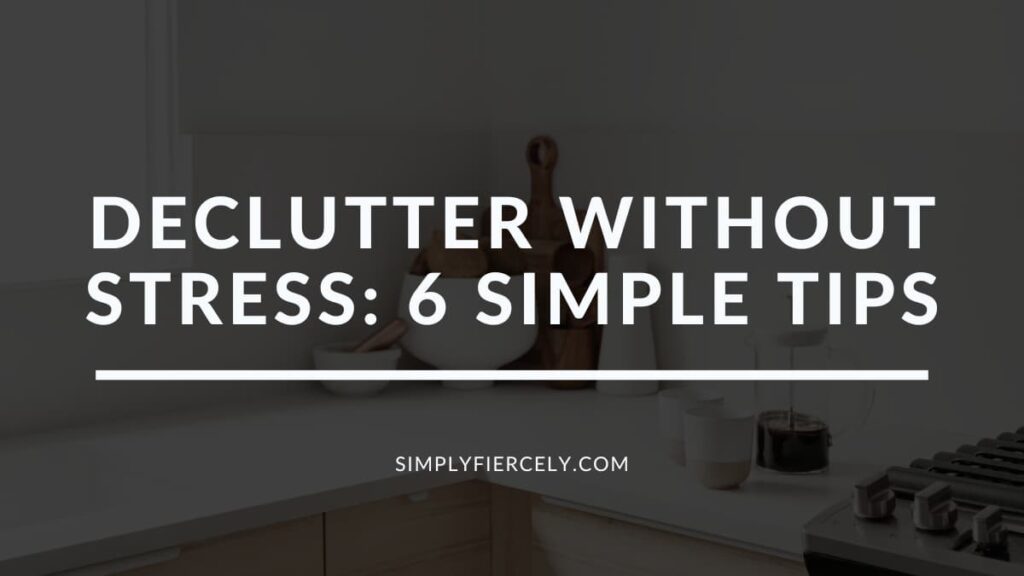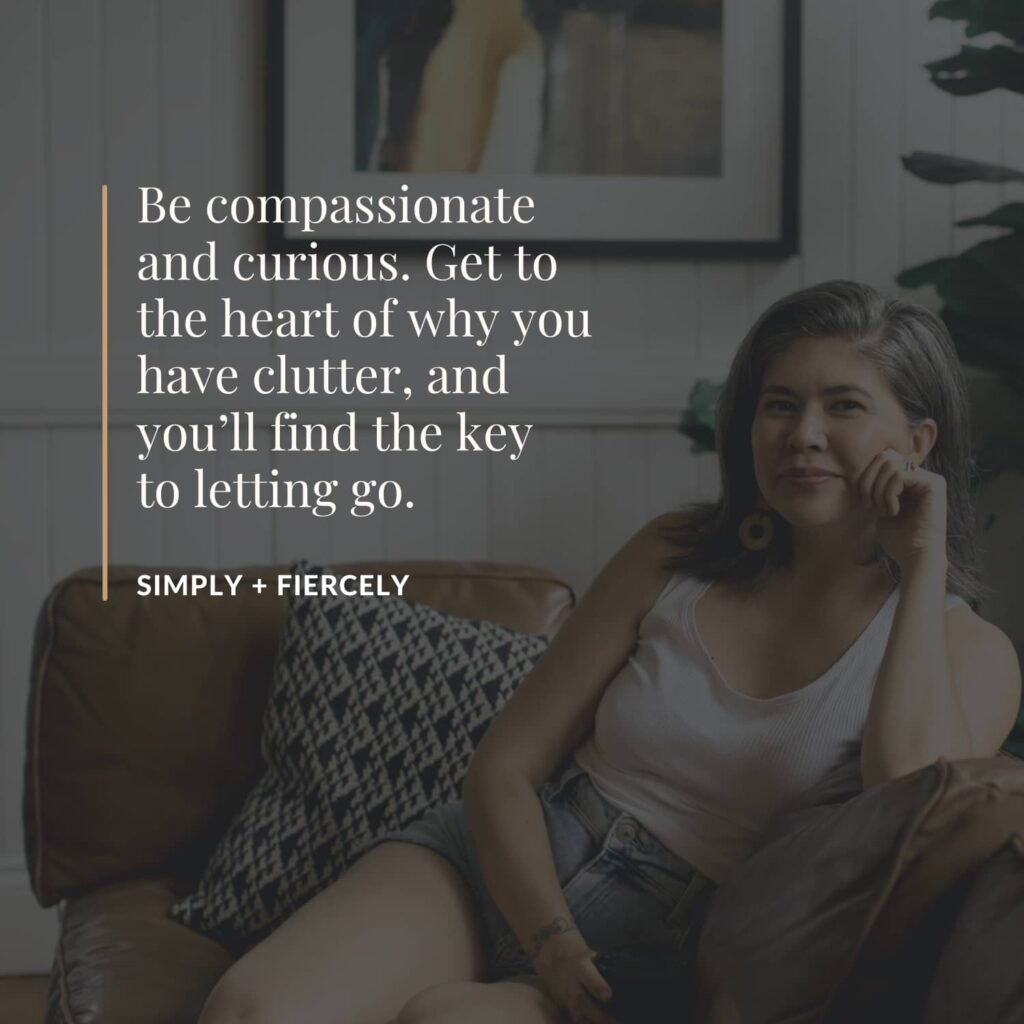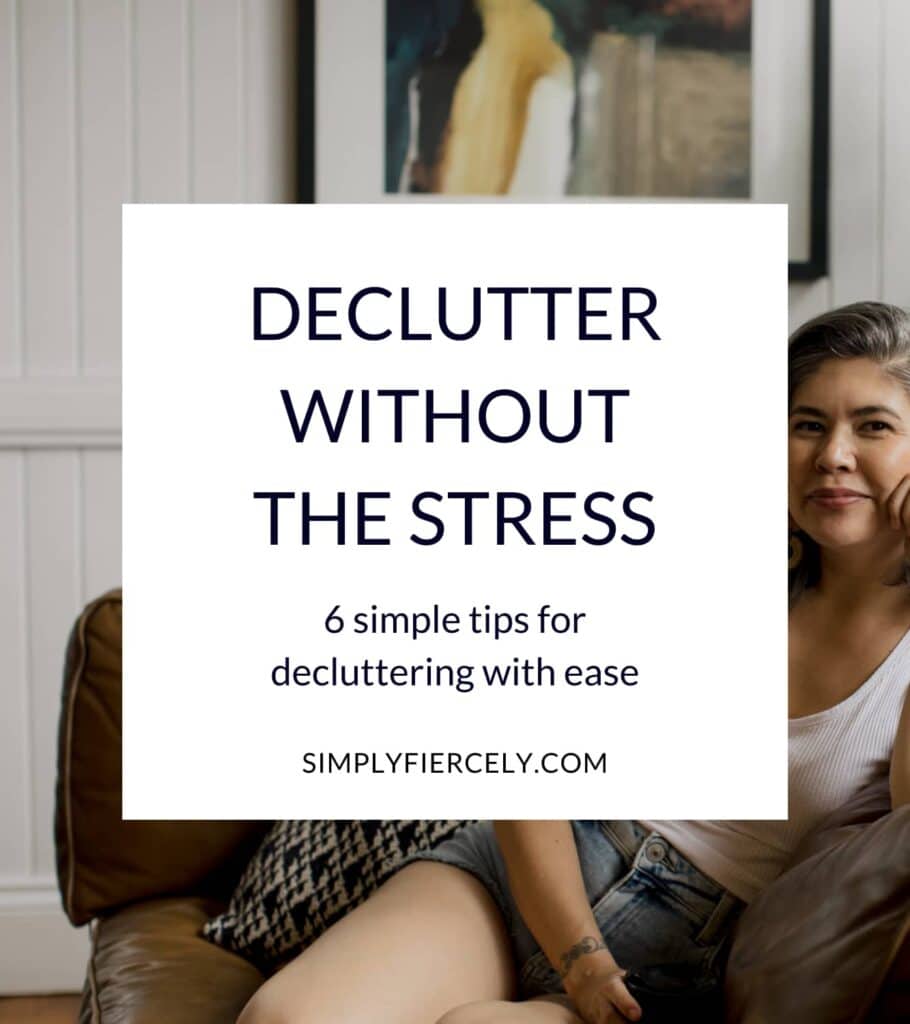Decluttering is one of those things that sounds SO simple in theory. All you have to do is decide what brings you joy and then let go of the rest. Easy, right?
Unfortunately, for most people, the reality is a bit more complicated. Instead of making effortless decisions about what to keep, we agonise for hours. Progress is slow, and it’s easy to feel defeated.
Eventually, stuff is shoved back into our closets or under the bed, out of sight and out of mind. It’s all too much—but it doesn’t have to be that way. Here are six simple tips to help you declutter without stress, no matter what you’re up against.

What Makes Decluttering Stressful?
Before we talk about stress-free decluttering, it helps to understand why we feel stressed in the first place. Is it because we have so much clutter in our homes?
Not exactly. Stress is “the feeling of being overwhelmed or unable to cope with mental or emotional pressure.” In other words, having a lot to declutter can feel stressful, but the cause of stress is less about how much you have to do and more about how equipped you feel to handle it.
If your expectations are unrealistic (you’re trying to do too much without allowing enough time) or you’re approaching decluttering without a clear strategy, then stress and overwhelm are inevitable.
It’s like being asked to cook a five-course dinner in one hour, using ingredients you’re not familiar with, without a recipe to guide you. Even a superstar cook would struggle to cope because it’s simply too much to manage.
The same applies to decluttering—and I know it might sound obvious, but I’ve worked with enough women to know that it’s a common mistake. Decluttering seems simple, so we go in with guns blazing, confident that we’ll get everything done before the end of the weekend.
But more often than not, we end up surrounded by haphazard piles and a bigger mess than when we started. We’re in over our heads, and we wonder what went wrong.
Now, I know this might sound negative, but it’s actually promising. Once we understand why decluttering is stressful, we have the keys to transforming the experience. By expanding our ability to cope, we can declutter without stress or perhaps, even with ease.
How Do You Declutter Without Stress
1. Embrace slow decluttering
First and foremost, let go of the idea that you have to declutter quickly. Yes, some people will tackle their entire home in one wild weekend. But this is the exception, not the rule.
Of course, if you’re new to decluttering, you might be one of the lucky ones. But what if you’re not? How will you feel if you set the bar too high and don’t manage to follow through?
My guess is something like this:
- I’m such a failure…
- Ugh, I’ll never get this done!
- I give up; this is impossible.
Not fun, right? And you can bet that your mind will remember. Next time you attempt to declutter, you’ll feel so much resistance because the last experience was so miserable. You’re just digging yourself a hole, and if nothing changes, it will get harder and harder each time.
The alternative is to embrace slow decluttering. Acknowledge that it took a long time to accumulate your clutter, and it might take a while to let it all go. Set realistic expectations, do a little bit at a time, and then pat yourself on the back for following through with your plans.
I know that it’s hard to go slowly (trust me, patience is not my strong suit)—but the way I see it, you have two options. Be intentional about taking your time and feel good about it, or set yourself impossible goals and deal with the fallout.
Either way, you can only do your best. The question is how much stress and frustration you want to invite into your life.
2. Acknowledge the emotional side of letting go
There are hundreds, if not thousands, of blog posts and books about decluttering. Obviously, I haven’t read them all! But from what I’ve seen, there is a lot of advice that sounds like this:
- It’s just stuff!
- Collect moments, not things.
- Your memories aren’t in your stuff.
Does any of this sound familiar?
If so, you might be wondering why it’s so hard to let go—it’s just “stuff”, right?
Wrong. After years of beating myself up and wondering what on earth was wrong with me, I learned a powerful lesson.
Our stuff is not just “stuff”. Instead, the things we own are often a physical manifestation of our hopes, dreams, fears, insecurities, and more.
In this light, decluttering becomes soul work. We have to face our fears, grieve our losses, and challenge long held beliefs. It feels hard because it IS hard, and that’s OK.
You’re not broken or somehow inferior if you feel a strong attachment to your things. So stop stressing about why decluttering is hard, and instead, be compassionate and curious. Get to the heart of why you have clutter, and you’ll find the key to letting go.
Related Post: How to Declutter When You Regret Spending Money
3. Create systems that break the clutter cycle
Do you know what’s really stressful? Working hard towards something that feels completely pointless or impossible to achieve.
And for many people, that’s exactly what decluttering feels like: you get rid of one thing, and somehow, two new things appear in its place!
It’s enough to make you want to tear your hair out—but you can turn things around with this simple tip. Next time you declutter anything from your home or life, pause for a moment and ask yourself this one question:
Is there a boundary or system I could implement to stop this from cluttering my life in the future?
For example, if you’re decluttering a dress that you’ve never worn—ask yourself, “Why don’t I ever wear this?” Is it the fabric? The hemline? The colour?
Use what you learn to make a decision about the future. For example, I don’t buy anything yellow, polyester, or dry clean only.
I’ve learned these items will always end up in the decluttering pile, so I’ve set a clear boundary that saves me from making these mistakes again in the future.
Less stuff comes into my home, which means my decluttering has a bigger impact. I work smarter, but not harder, and that’s a win-win in my book!
Related Post: 4 Thoughtful Questions to Ask When Decluttering
4. Beware of perfectionism
When I first discovered minimalism and decluttering, I remember thinking, “I’m OK with owning less stuff—I just want to own the best stuff.”
And of course, I believe in quality over quantity. But this is a slippery slope that can lead to perfectionism.
I know because I’ve been there. In the early days, decluttering was stressful because I could never achieve the perfect “Pinterest worthy” home of my dreams no matter what I did.
Somewhat ironically, I felt compelled to buy more … because I wanted to be more minimalist. Which, of course, makes no sense, and this inner battle only managed to notch my stress up to new levels.
Finally, I had to realise that I’m a real person and I don’t live inside an IKEA catalogue. I was clearing the clutter, but not the life from my home (and real life will always be imperfect).

5. Write a plan
Most people end up decluttering on a whim. Maybe you were watching an episode of Marie Kondo’s Tidying Up and felt inspired? Or you found yourself rage decluttering after spending an hour looking for a missing shoe?
Whatever the spark, the outcome is often the same. You take on too much, regret getting started, and end up unnecessarily stressed.
Avoid this by writing a simple plan for your decluttering projects. Here are some things to consider:
- Be intentional about where to start decluttering (this list has a few great suggestions!)
- Decide what you’ll do with the stuff you declutter (will you donate, sell, recycle, etc.)
- Think about your goals (if it’s a big project, what does “done” look like for today?)
- Realistically, how much time do you have to spend?
It doesn’t have to be complicated. Just spend a few minutes thinking about what you’re trying to achieve and how you’ll do it before you begin.
6. Focus on what you’re creating
Humans hate giving things up. Some psychological studies suggest we feel the pain of losing something twice as strong as the joy of equivalent gains. This theory is known as loss aversion, and it explains why decluttering can feel stressful or even painful.
It’s normal to feel this way, but I’ve found that a simple reframe can transform the entire decluttering experience. Instead of focusing on what you’re giving up, shift your attention to the life you’re creating by decluttering.
Be specific—why are you decluttering, and how will it add value to your life? (If you need inspiration, here are some benefits of decluttering you may not have thought of.) The more clarity you have about your vision for the future, the easier it will be to follow through with your plans.
Decluttering For Less Stress
I hope these tips help you to feel less stressed about decluttering, but if you’re still overwhelmed, here are a few posts you should check out:
- What To Do When You’re Overwhelmed By Clutter
- 8 Tips That Will Help You Find Motivation to Declutter
- 21 Decluttering Tips That Will Help When Nothing Else Works
I know it’s not always easy, but the secret is just to get started. Evidence shows that decluttering can reduce stress by lowering the stress hormone cortisol, improving focus, and increasing self-esteem and confidence.
In other words, the more you do, the easier it gets. So let go of expectations or any internal pressure you’re feeling to be perfect or get the job done quickly.
Instead, just put one foot in front of the next, and trust the process. Decluttering can be hard, but we can all do hard things when we treat ourselves with compassion and kindness.
What are some of your tips for decluttering with less stress? Let us know in the comments!



What I tell people when they are overwhelmed and don’t know where to start is, start small, start somewhere…a drawer, a cupboard, one shelf etc. Once you see a bit of progress you will have some motivation and these small projects help build our confidence for the bigger projects.
It’s worth noting that the people evangelizing that it’s just meaningless stuff are all married with kids, and a lot of them married young. They didn’t have the experience of getting older as a single and having your friends and siblings disappear one by one as they partner up and stop maintaining their platonic relationships.
They’re not just meaningless things. They’re the things that stayed after all your people decided you’re not important any more. It’s completely irrational to ascribe human traits to objects, but maybe I wouldn’t be doing that if people didn’t always flake on me when someone comes along that gets their hormones going.
Absolutely. I wrote a post once acknowledging that “stuff” can be like a scar — proof we did hard things and survived. Sometimes letting go is hard, and it’s not right for everyone. It’s about finding the balance that’s right for you, letting go of expectations, and decluttering at a pace that works for your life. Take care!
Great post Jennifer! I love the point about focusing on what you are creating. I’ve been a minimalist and lived in tiny spaces for a long time but it is still hard to let of things. What I focus on is the way I want my life to look in a few years. My goals for the future help me let go of stuff that doesn’t fit in my life or my future. Those same goals help me avoid wasting money on bringing more clutter into my home.